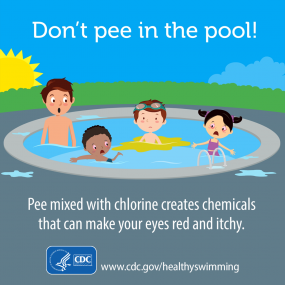Red Eyes and Swimming
Red eyes or irritated nose or throat after swimming? Blame the pee, poop, and sweat!
To help protect swimmers’ health, chlorine is commonly added to the water to prevent the spread of germs and outbreaks. But chlorine can also combine with what comes out of or washes off of swimmers’ bodies, such as, pee, poop, sweat, dirt, skin cells, and personal care products, such as deodorant and makeup). This causes two problems:
- It decreases the amount of chlorine available to kill germs.
- It creates chemical irritants called chloramines (“chlor,” short for chlorine, and “amines,” compounds that contain nitrogen).
Healthy pools and other places where we swim in chlorinated water (for example, water playgrounds) don’t have a strong chemical smell. If you smell “chlorine” at the place you swim, you are probably smelling chloramines. Chloramines in the water can turn into gas in the surrounding air. This is particularly a problem in indoor pools, which often aren’t as well-ventilated as outdoor pools. The chloramines that form in the chlorinated water we swim in are different from the chloramine that is sometimes used to treat drinking water.
What are the health effects associated with chloramines?

Breathing in or coming into contact with chloramines at the places we swim can lead to negative health effects in swimmers and others in the swimming area, including:
- Everyone (swimmers and others in the swimming area)
- Respiratory symptoms such as nasal irritation, coughing, and wheezing. Asthma attacks can be triggered in people who have asthma.
- Swimmers
- Red and itchy eyes.
- Skin irritation and rashes.
What can I do to reduce chloramine formation?
We all share the chlorinated water we swim in and the surrounding air we breathe. Here are a few simple and effective steps swimmers can take to help protect our health and the health of our family and friends:
Keep pee, poop, sweat, and dirt out of the water!
- Never swim or let your kids swim if sick with diarrhea.
- Use the toilet before getting into the water.
- Shower before getting into the water. Rinsing off in the shower for just 1 minute removes most of the dirt or anything else on your body.
- Wear a bathing cap while in the water.
- Never pee in the water.
Take a break—every hour!
- Take kids on bathroom breaks.
- Check diapers and change them in a bathroom or diaper-changing area to keep pee and poop out of the water.
Talk to others.
- Tell other swimmers and parents of young swimmers about chloramines and the steps they can take to help prevent them.
- Encourage pool operators to take steps known to prevent and get rid of chloramines.
- Tell the lifeguard or pool operator immediately if you or your family or friends:
- See poop in water;
- Smell chemical odors in the swimming area; or
- Experience respiratory, eye, or skin irritation that could be linked to the water or the air surrounding the water.